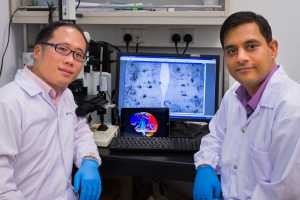07 Apr Deep Brain Stimulation Has Potential to Treat Dementia and Memory Loss

Associate Professor Lim Lee Wei (Sunway University, Malaysia) and Assistant Professor Ajai Vyas (Nanyang Technological University, Singapore) discover a new treatment using deep brain stimulation of the Prefrontal Cortex for dementia.
MedicalResearch.com Interview with: Dr. Lim Lee Wei
Medical Research: What is the background for this study? What are the main findings?
Response: To date, pharmacological treatments for dementia have limited effects (most of the drugs failed in the second or third clinical trials) and there are no known treatments that cure or delay the progression of this memory impairment. Therefore, a novel non-pharmacological approach such as deep brain stimulation (DBS) is currently considered as an alternative treatment to reduce the symptomatic and progression of this memory deterioration.
Deep brain stimulation for dementia-related disease is currently evaluated as a potential therapy. In line with this development, evidence from recent studies suggests that deep brain stimulation might enhance memory functions when particular brain areas are stimulated. Of particular interest in our study, electrical stimulation of the Prefrontal Cortex induced striking antidepressant activity in both patients and animals studies (see our recent study, Lim et al., 2015 Translational Psychiatry; http://www.nature.com/tp/journal/v5/n3/full/tp201524a.html). However, no studies have shown the putative role of Prefrontal Cortex deep brain stimulation in learning and memory performance. In our finding, we have shown that deep brain stimulation of this region (Prefrontal Cortex) improved the short-term and long-term memory by a very important mechanism, which led to the formation of new brain cells in another region of the brain called the hippocampus, which is also involved in memory. Therefore, our findings suggest that deep brain stimulation of the Prefrontal Cortex has the potential to be developed into a therapy to treat dementia and other conditions that lead to memory loss in humans.
Medical Research: What should clinicians and patients take away from your report?
Response: My simple answer would be the title of our research paper in eLife http://elifesciences.org/content/4/e04803 deep brain stimulation of the prefrontal cortex enhances memory by a mechanism of neurogenesis in the hippocampus, a brain region involved not only for emotion, but also memory and learning behaviours.
Medical Research: What recommendations do you have for future research as a result of this study?
Response: Our research can be seen as a first critical step towards the potential application of deep brain stimulation in patients with Alzheimer’s disease and aged-related dementia. The next challenge is to use this derive target structure (Prefrontal Cortex) for clinical DBS application (trials) in diseases characterized by dementia. Our present findings will be crucial for accelerating and validating clinical application of deep brain stimulation, which is likely to provide more rapid and robust therapies for this debilitating disorder. Furthermore, there is a foreseeable possibility of identifying novel mechanisms of brain function that would facilitate the investigation and management of patients with severe neurodegenerative disorders. If deep brain stimulation is effective in symptom-reduction in dementia, then it could be a major breakthrough for patients, families, and caregivers. We estimate that this would take approximately 1-2 year(s) in order to see the treatment result for patients with dementia.
Citation:
Albert Liu, Neeraj Jain, Ajai Vyas, Lee Wei Lim
Nanyang Technological University, Singapore; Sunway University, Malaysia
eLife 2015;4:e04803
DOI: http://dx.doi.org/10.7554/eLife.04803
Published March 13, 2015
[wysija_form id=”2″]
MedicalResearch.com Interview with: Dr. Lim Lee Wei (2015). Deep Brain Stimulation Has Potential to Treat Dementia and Memory Loss
Last Updated on April 7, 2015 by Marie Benz MD FAAD
